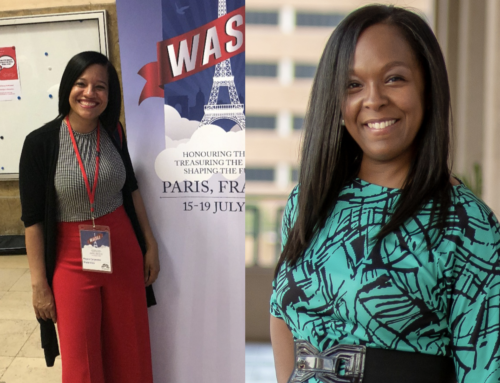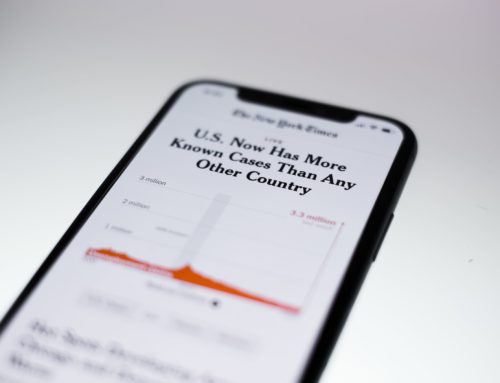Diversity in Higher Education: Starting the Discussion*
*We’re excited to announce that the author of this feature article will be presenting a supplemental webinar! The Webinar will be presented live on Thursday, December 6, 2018 from 6-8 pm ET. Click here to register now
Royce Carpenter, M.A., NIC Master
 It is my hope that this article can be a starting point to an important discussion about the need for standards on diversity, specifically including people of color (POC), in interpreting education. This means purposeful selection of POCs as language models, especially in rural areas, and literature about and from POCs (McCaskill, Lucas, Bayley, & Hill, 2011; Hairston, Smith, 1998). Working with various Deaf and hearing people can be challenging without the proper knowledge and tools. In many cases, the challenge is compounded when the interaction is with people of color, whether they be consumers or teams.
It is my hope that this article can be a starting point to an important discussion about the need for standards on diversity, specifically including people of color (POC), in interpreting education. This means purposeful selection of POCs as language models, especially in rural areas, and literature about and from POCs (McCaskill, Lucas, Bayley, & Hill, 2011; Hairston, Smith, 1998). Working with various Deaf and hearing people can be challenging without the proper knowledge and tools. In many cases, the challenge is compounded when the interaction is with people of color, whether they be consumers or teams.
The challenge is not because of the people of color but because there has been a lack of education in interpreting programs related to the narratives and signing styles of people of color (Carpenter, 2017).
It is inevitable that we will work with various ethnic groups in the interpreting field, whether they are Deaf or hearing consumers, or our interpreting teams. The many facets of cross-cultural relationships and encounters cannot and should not be ignored. There is a need to understand the varied perspectives, life experiences, and schemas of individuals who have perspectives which are different from your own or the majority culture. Learning about such diversity of thought and experience cannot be something placed upon the shoulders of a novice interpreter at graduation. It should be the charge of the educators to expose students to the possibility or rather, the likelihood that these interactions and relations will occur. Interpreter education professors, instructors, and teachers are the ones who must pour into the students knowledge about diverse ethnic experiences that touch the interpreting process. These are lessons that the student, on their own, would not learn until they encountered the experience up close and personal.
There is a lack of diverse cultural narratives in many interpreter education programs. This disparity in educational materials and teachings about people of color is seen by some scholars as continued oppression and ethnocentrism (Delgado, 1995). There is certainly not a standard of diverse education across colleges and universities where generations of interpreters are being taught.
In my research on cross-cultural mentoring, I held focus groups with black and white interpreters of varying ages and experience. With the help of a white facilitator, the groups were mono-ethnic, so participants could be more open to answering questions related to race and ethnicity in their educational experiences without feeling they were being judged by a person of another ethnicity or culture (Carpenter, 2017).
One of the questions asked of participants was how much and what type of education they received concerning Black Deaf and Black hearing people in their interpreter education programs (Carpenter, 2017). None of the interpreters had a full semester or quarter course dedicated to the minority experience: whether it was the Black, Latino, Asian, Islamic, or Pacific Islander (Carpenter, 2017). Many of the interpreters said they faintly remembered some things related to the Black Deaf culture but nothing any of them could explain in great detail. A few of the focus group participants who were also educators felt it was not their “place” to teach about cultures that were not their own. Participants of color felt isolated and uncomfortable that their teachers would defer to them when issues of race were brought up in class (Carpenter, 2017).
Historically, residential schools faced similar disparities in the education of Deaf people regarding minority narratives and experiences (McCaskill, Lucas, Bayley, & Hill, 2011). Is this really ethnocentrism in interpreter education or is it simply fear and even avoidance of the unknown? The histories of marginalized people are often left out of education, not by design perhaps; the narratives are absent due to privilege or complacency. Curricula without the inclusion of various ethnic stakeholders perpetuates an unbalanced educational system that can have a negative systematic and economic impact (Delgado, 1995; Delgado, Stefancic, and Harris, 2017).
Understanding the history of all Deaf and hearing stakeholders can prepare interpreters for the future of the profession (Pinkley, 2015).
Interpreter education governing bodies have tried to include diversity as a standard for interpreting programs (CCIE, n.d.). What is not clearly addressed is how to educate interpreting students about the diverse, multi-faceted experiences of people of color. The intersection of color for many diverse people is being slighted in interpreter education. This snub comes at the expense of interpreting students and consumers. Understanding the differences between ethnic and cultural norms can help educators, interpreters, and students better prepare for the consumers they will serve.
Isn’t the point of education to influence not only the learner’s understanding but to change the world we live in and make it better? Conversations and education about racial issues are often avoided, put on the back burner, and even dismissed as “trouble” by privileged groups. Communication between privileged and less privileged groups is often difficult (Lozano-Reich & Cloud, 2009). Avoiding needed conversations is like neglecting to take care of an infection in part of your body. The infection grows and damages other areas and can cause unknown harm.
In reality, tough conversations can be like salve to the soul if approached with openness of heart and mind and attentiveness to each other’s perspectives.
I have witnessed these interactions and conversations during my workshops on cross-cultural mentoring. They have become awakenings which have produced revealing and healing learning environments.
In this article, I am not saying that no one is teaching about the multi-faceted experiences of people of color. There are wonderful classes in sparse parts of the country. The need remains to have “Standards in Education” regarding the history, experiences, narratives, and signing styles of Deaf and hearing people of color in interpreter education programs. For more information, the reader could see Carpenter, R. M. (2017), Let’s Bridge the Gap! Cross-Cultural Mentoring (Master’s thesis, retrieved from https://digitalcommons.wou.edu/theses/43). The first step is discussion – understanding there is an issue which needs be addressed in our profession. RID has taken a bold step by offering this article in VIEWS. Please join in the conversation!
References
Carpenter, R. M. (2017), Let’s Bridge the Gap! Cross-Cultural Mentoring (Master’s thesis). Retrieved from https://digitalcommons.wou.edu/theses/43.
CCIE. (n.d.). Accreditation Standards 2014. Retrieved from http://ccie-accreditation.org/.
Delgado, R. (Ed.). (1995). Critical Race Theory: The cutting edge. Philadelphia, PA: Temple University Press.
Delgado, R., Stefancic, J., & Harris, A. (2017). Critical Race Theory (Third Edition): An Introduction. New York, NY: New York University Press.
Hairston, E., Smith, L. (1998). Black and Deaf in America: Are we that different. Silver Spring, MD: T.J.Publ.
Lozano-Reich, N. M., & Cloud, D. L. (2009). The uncivil tongue: Invitational rhetoric and the problem of inequality. Western Journal of Communication, 73(2), 220- 226.
McCaskill, C., Lucas, C., Bayley, R., & Hill, J. (2011). The hidden treasure of Black ASL: Its history and structure. Washington, D.C.: Gallaudet University Press.
Pinkley, J. (2015). History quote of the day: Teddy Roosevelt [Web log]. Retrieved from http://discoverhistorictravel.com/history-quote-of-the-day-teddy- roosevelt/
Royce Carpenter, M.A., NIC Master is the Interpreter Education Program coordinator at Columbus State Community College. She  interprets in a variety of settings. Royce has worked in the role of VRS interpreter, conference interpreter, workshop presenter, conference coordinator, and mentor. Royce holds a RID NIC Master certification, an Associate’s degree in Interpreting/Transliterating from Columbus State Community College, a Bachelor’s degree in Organizational Management from Wilberforce University, and a Master’s degree in Interpreting Studies from Western Oregon University. In August 2017, Royce traveled to Ghana to teach at the University of Education, Winneba with an amazing team from Western Oregon University.
interprets in a variety of settings. Royce has worked in the role of VRS interpreter, conference interpreter, workshop presenter, conference coordinator, and mentor. Royce holds a RID NIC Master certification, an Associate’s degree in Interpreting/Transliterating from Columbus State Community College, a Bachelor’s degree in Organizational Management from Wilberforce University, and a Master’s degree in Interpreting Studies from Western Oregon University. In August 2017, Royce traveled to Ghana to teach at the University of Education, Winneba with an amazing team from Western Oregon University.






Leave A Comment
You must be logged in to post a comment.